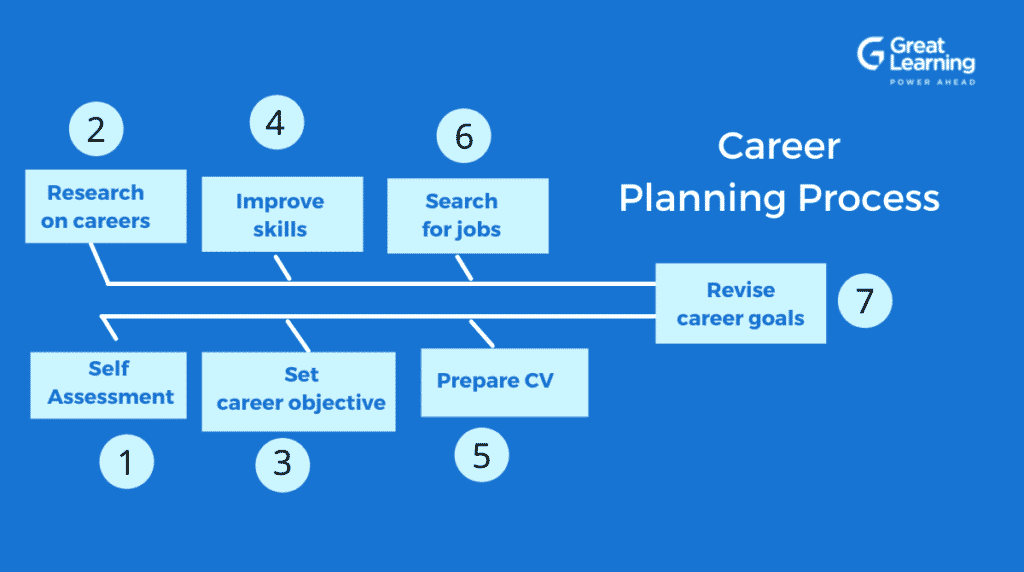- What is a career?
- What is Career Planning?
- What is a career goal?
- What is a career plan?
- Types of career path
- Why is career planning important?
- Objectives of career planning
- Benefits of career planning
- Difference between job and career
- Components in career planning
- Career Planning Process
- Career Planning Pro Tips
What is a career?
A career is any occupation, profession, trade or vocation worked on for a given sum of time, in return for a sum of money, which can be paid hourly, weekly, monthly or early. While some careers can be learnt on the job, some careers require extensive education and training in the form of high school diploma, degree , masters degree and PHD’s.
Example of a career
- Baker
- Chef
- Doctor
- Teacher
- Engineer
- Carpenter
- Lawyers
- Electrician
What is Career Planning?
Career planning is finding the right job that fits your skillsets, your interests, your level of talent and values. On other hand, it can also be defined to be a step taken back to understand the prospects of growth in one’s profession.
As said rightly by a wise one “It is important to leave one destination in order to set sail on another journey.” Similarly career planning helps you answer questions such as – Are you happy with the work you do today? – Do see yourself growing to bigger positions?
If your answer to all the questions is yes, you are on track towards achieving all your goals. Career planning on the other hand, in this case can help one in improving one’s career prospects at present and in the future. However if you are just out of college and in search of your first employment opportunity, career planning can help you get closer to your dream job.
What is a career goal?
A career goal is a statement that explains how to plan progress in your career. Clear career goals are important for every candidate. And well planned career goals make it easier to get jobs, succeed, earn more, and grow. They can be short-term, like getting a promotion or certification, or they can be long-term, like running your own successful business or being an executive at your dream company.
Setting unfeasible goals can lead to disappointment but that doesn’t mean that one should stop planning their goals altogether. Commitment towards your career goals is the easiest way to keep yourself focused to achieve your dreams.
What is a career plan?
A career plan is a practical approach that allows you to determine your skills and interests, set career goals, and put into action where it will help you reach them.
It’s a constant process which includes an overview of:
- Your current skills and experience
- Your likes and interests
- Your career goals
- Your priorities
- Your intended actions
- Your problem solving method
Types of career path
There are 4 types of career path –
- Knowledge-based
- Skill-based
- Entrepreneur-based
- Freelance
Knowledge –
Knowledge-based career paths allow you to use the knowledge that you have acquired over the past. Employees in HR, marketing, and accounting follow a knowledge-based career path. Other examples involve IT professionals and engineers.
Skills –
Skill-based careers need an understanding of how a particular job function operates. These are mostly physical, hands-on, or service skills. Example construction industry, as well as performers, artists, and restaurant chefs.
Entrepreneur –
An entrepreneur solves a problem by selling their own products or services. An entrepreneur can work independently or start a business and hire employees.
Freelance –
People hire independent contractors or freelancers to perform a specific job or project. Freelancers offer multiple services, including graphic design, consulting, home repair, and photography.
Why is career planning important?
Career planning is an easy way to ensure your career is going in the right path. It is important to propose your career planning as it gives you the much needed direction and makes it clear where you see yourself in future. It gives you an idea of your strengths and weaknesses and the skills and knowledge that are required to achieve your goals.
Large amount of time of our life is spent in achieving our career goals, hence it is necessary to make sure that right steps are taken and appropriate planning is done in the early years of your life. Thus career planning gives your career true meaning and purpose.
Objectives of career planning
The vital objectives of career planning are as follows :
- To identify positive aspects of the employees.
- To understand each employee’s uniqueness.
- To value the feelings of other employees.
- To bring forward talented employees to the organization.
- To train employees towards team-building skills.
- To create different ways of dealing with conflicts, emotions, and stress.
Benefits of career planning
- Career planning motivates an employee’s growth and development.
- It helps in improving the commitment of employees towards organisation.
- To choose a career suitable for their longevity and lifestyle.
- It ensures that senior management knows about the capability of the employees.
- Increased job satisfaction.
- Career planning reduces staff resignations.
Difference between job and career
| Job | Career |
| A short-term pursuit. | A long-term pursuit. |
| Job is something we do to earn money. | Career is a bridge towards employment opportunities. |
| A job has minimal impact on our future work life. | Career provides experience and learning to boost our future. |
| Few networking opportunities. | Many networking opportunities. |
| Usually it isn’t planned. | Usually it is planned. |
Components in career planning
- Educational planning and Career planning – Action planning, Problem setting and Goal setting,
- Occupational exploration– Gathering information of labor market, conducting information interviews and Attending job fairs.
- Self-Analysis – One can find a job on their own, when he/she learns a little more about his/her skillsets, areas of interest and overall work experience.
Career Planning Process
Following are the steps in career planning process:

- Self Assessment – Take a closer look at your life and pick one out of the all you do in a day and decide whether you would like to that one thing for the rest of your life. May it be a passion or anything you have learnt professionally.
- Research on careers – Once you answer the first question , you need to dive deep and do all the research it takes to find a career path.
- Set Career Objectives – Write down a set of objectives you would want to achieve at a given time and do whatever it takes to achieve the results.
- Improve Skills – You need to look at the available career paths and sign up for professional courses to make yourself equipped for its requirements.
- Prepare CV – You can either work on a CV or take the help of a friend while working on your CV. Make it right to fit the requirement.
- Search for jobs – A job today can easily be found on job sites such as linkedin and Naukri to name a few.
- Revise career goals – Once you find a career , you need to plan accordingly and work towards achieving growth in your path ahead.
Career Planning Pro Tips
List every career fantasy, notice the patterns and write them down. Identify the activities you think you will enjoy and be satisfied with. What kind of expertise do you have and what kind of experience do you have? Maybe it is event management, fashion designing, working alone or even travelling or being considered a leading authority in your field. This activity will help you in finding out what types of careers you want to pursue in your life from now on. Each of those careers will allow you to express your passion. Just discover what exactly you are passionate about and you will love your work.
- Discover what you can make money from: – The next phase in your career plan is if you can generate revenue from your passion. Just because you love doing something does not mean you can make living at it. You need to check if you can monetize your passion. For example, you love painting but that is not a sustainable career so you can become a graphics designer teacher and that can be profitable. Some passions are not monetizable. Be open to adjusting your goal. Be aware of the larger trends of the economy. Consider whether there is currently a market for what is what you want to do. Be sure of the industry you want to work in as well as the state of the broader economy.
- Setting attainable career goals: – Identify your career goal. Clearly identify it and work backwards, defining all the milestones you need to hit in order to reach it. For example, you are working in an accountant firm and your long-term goal is to be a business consultant. You need to ask yourself these questions like why do you want to be a business consultant? In what field do you want to consult? What is your value? What are your qualifications and experience? So we need to build a firm foundation of our goals and need to understand the relevant skills required to achieve those goals. Create a detailed picture of what your goal is before you begin to do anything. Proper research and planning is required so that will help you to focus and reduce your stress level.
- Creating short-term and long-term goals: – Long-term goals can be defined as the fulfilment of the dream and will take many steps to achieve. Short-term goals are the milestones necessary to achieve long-term goals. Big projects seem like a giant’s mountains that’s really scary to have to climb. As an alternative, imagine each step as a small hill you can easily climb.After you have successfully completed each task, congratulate yourself for a job well done. For example, your long-term goal can be to become a business consultant for which the short term goal could be to achieve a Certified Public Accountant degree. People who are talented and driven are likely to succeed.
- Time management is key: –Time is a scarce resource that all of us need to learn to manage. Prioritizing your time and using it efficiently are essential if you’re going to successfully complete the projects that will lay the foundation for the career success you are after. Keep a time journal to track how you spend your time, this time budget will give you a clear picture of your routine after which you can make necessary adjustments so you can increase efficiency. With your career goals in your mind you can now decide how to best utilize your time in order to accomplish those goals. Avoid any bad habits that get in the way of your commitments. You have a potential to change lives , be the change you want to see in the world.
- Personal branding and communication: – Credibility and visibility go hand in hand. Unless people know what you do, you won’t be able to sell it. Firstly, define your brand. What is it you do exactly? What can you do to make money or sale it for a client? Is there anything that makes you unique or special? What kind of talent, skills and experience do you have that will make employers want to work with you? Secondly, how to articulate your brand message. A thirty-second description of the skills you have to offer. That includes your passion, your personal and professional history. Thirdly, Network, market and sell your brand. Marketing yourself and your services needs to become an integral part of your life.
- Improve your verbal communication skills: –Your ability to articulate and engage, even charm people when you talk to people in the business world is critical to your success. A large percentage of our working life is spent not just doing actual jobs but interacting with the people with whom we work. If you want to overcome your shyness you can join an acting class which will help you to better connect with your audience and people in general. Assume that people’s time is valuable if they are going to listen to you, give them value in return.
- Building your professional Network: – You find work through the relationships you develop, but as your network grows into the thousands you won’t be able to remember the details of everyone. Meet in person and over a meal. In every culture people are comfortable to open up when they are breaking bread. Email, texting, tweeting are not conducive to do that. The more time you spend with someone the more likely they are comfortable to you talking about themselves. Build and deepen your relationships over time. Business can be seen as the practice of trading favours.
- Recruiting and accepting jobs: – Start your job search with your career plan. Determine which roles and companies you’d like to apply to, and compare them with your career plan. Find out if you’re eligible or if you need to take any other steps. A compelling cover letter can also demonstrate your passion for the role, field, and employer by incorporating your goal-setting strategy and career plan. The career plan is a great way to track how far you’ve come and exhibit your dedication and ability to set goals. During the interview process, you could use these items to prove your interest and qualifications to potential employers. Once you receive a job offer, make sure that the compensation, benefits, location, work-life balance, and responsibilities align with your self-assessment.
- How to negotiate your salary: – Be willing to walk away without a deal. You walk into a deal at a disadvantage if you absolutely have to cut one. In any negotiation keep two things in mind: desired result and compromised result. Before negotiating salary, you need to find a salary range which you can directly find in Job Posting or Research through Salary.com or Glassdoor. You can network and ask through people in your database located in those geographical locations who know the industry and this company and ask them what they pay. Salary considerations include a wide spectrum of things like benefits, learning opportunity, Company prestige, co-workers, management. You need to develop your self-worth and convey that to others and strike winning deals.
Build the road to the career of your choice by working on courses conducted by the best industry professionals and educators in the world at Great Learning.
A well-structured career plan includes preparation for interviews, which often requires strong verbal communication skills. If English is not your first language or you want to sharpen your speaking abilities, you can take advantage of a free English speaking course to practice and improve your fluency, giving you the confidence to ace interviews.
FAQs





